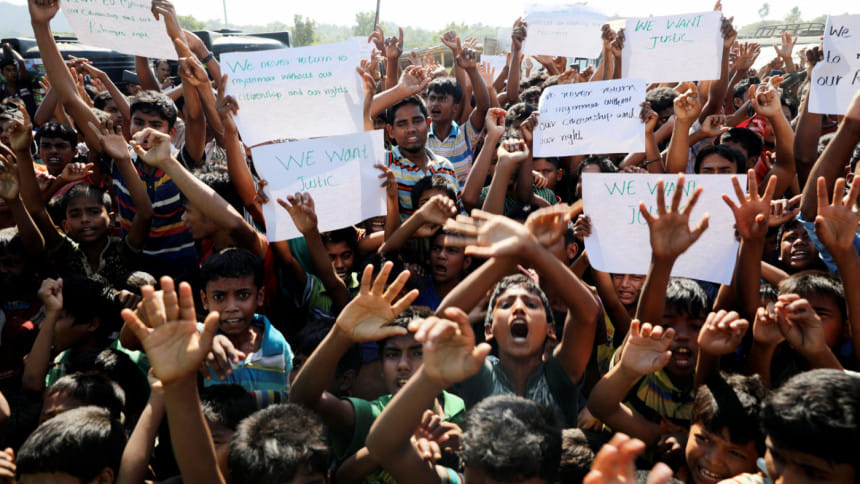Asean needs to engage more on Rohingya issue

The issue of over 700,000 Rohingya refugees from Myanmar who are currently taking shelter in neighbouring Bangladesh is undoubtedly one of the worst humanitarian crises of recent times.
Because of the sheer scale of violence and the subsequent massive human displacement, the United Nations and the United States described it as "ethnic cleansing" in 2017. Since then, the Canadian lawmakers have gone to the extent of unanimously calling it an act of genocide.
Moreover, a UN fact-finding mission report released in September this year concluded that there was a "genocidal intent" and called for the Myanmar military commander-in-chief and five generals to be prosecuted for orchestrating the gravest crimes under law.
While governments and international organisations have spoken out to condemn the disproportionate and overwhelming use of force by the Myanmar military or the inaction of the Myanmar civilian government led by Aung San Suu Kyi, the Association of Southeast Asian Nations (ASEAN) has largely been silent on the issue.
In fact, governments and rights groups around the world want to see ASEAN play an active and constructive role in helping address the deplorable humanitarian crisis. At the same time, there are also many who understand the complexity of ASEAN's organisational structure which makes it difficult for it to play such a role.
The fundamental principles of ASEAN require member-states to show mutual respect for the independence, sovereignty, equality, territorial integrity, and national identity of all nations; the right of every state to lead its national existence free from external interference, subversion or coercion; and non-interference in the internal affairs of the members.
These principles have undoubtedly prevented not only individual member-states but the organisation as a whole from engaging on the issue since Myanmar has not invited them to do so.
But that does not mean that ASEAN member-states have completely shied away from the issue. For example, the two Muslim-majority countries—Malaysia and Indonesia—have spoken out on the issue. The Malaysian government, in particular, has been quite vocal on the issue to the point of vehemently criticising Myanmar.
As the Rohingya issue has continued to overshadow several other important issues of the region, ASEAN leaders have begun taking a more visible position on the issue, especially under the chairmanship of Singapore.
On the sidelines of the UN General Assembly in New York in September this year, Singapore Foreign Minister Vivian Balakrishnan said that Myanmar should start taking back the Rohingya refugees from Bangladesh and must ensure that there is security, peace, justice and better prospects for everyone.
Balakrishnan had also said that "ASEAN will work with Myanmar to facilitate this process," and added that "This is something we will have to watch in the next few weeks, next few months."
The Singapore foreign minister had also expressed the need for an independent investigation into alleged crimes and hold people who are responsible fully accountable. He also said, "Right now, there are a million people suffering. There's a humanitarian disaster…unacceptable in this day and age."
The regional grouping's frustration was manifested again during the 33rd ASEAN summit in Singapore held from November 11 to 15, 2018. Unlike the previous ASEAN summits, the Rohingya issue was discussed in almost every forum by ASEAN leaders and their dialogue partners from the Asia-Pacific.
During the summit, Thai Prime Minister Prayut Chan-o-cha told his ASEAN colleagues that Thailand, which will chair the regional grouping next year, view the regional bloc as capable of playing an important role in addressing the situation in Rakhine in a constructive, tangible and sustainable manner.
Prayut suggested the enhancement of the ASEAN Coordinating Centre for Humanitarian Assistance on Disaster Management to provide humanitarian assistance to the affected people, as well as support the repatriation of Rohingya refugees and to ensure the improvement of quality of life for all communities in Rakhine state.
The recent developments from ASEAN show both frustration and a desire to engage more on the Rohingya issue. But the key question is whether Myanmar would welcome such a diplomatic gesture from fellow ASEAN states.
There is a possibility that Myanmar could construe such moves as an attempt to interfere in its internal affairs, which is apparently against the non-interference policy of ASEAN.
But Myanmar has to understand that it has already internationalised the Rohingya issue following the constitution of the Kofi Annan Commission in 2016, and then the formation of an Advisory Commission for the Implementation Committee of Rakhine State last year with experts from home and abroad.
Moreover, in June this year, Myanmar had signed a Memorandum of Understanding with the Office of the UN High Commissioner for Refugees (UNHCR) and the UN Development Programme (UNDP) to create conditions conducive for voluntary, safe, dignified, and sustainable refugee returns from Bangladesh, and their reintegration in the country.
Since it has already engaged with the UN agencies and international experts, Myanmar should welcome ASEAN's goodwill gesture to help address the protracted Rohingya crisis. An attempt to oppose the ASEAN's desire to engage will only hamper the cohesion and strength of the organisation, and invite criticisms from the international community.
Besides the ASEAN summits, platforms such as the ASEAN Defence Ministers' Meeting (ADMM) and the ADMM-Plus should be utilised to explore possible ways to cooperate with the Myanmar military, which not only controls the security matters of the country but also retains significant political power.
But left unaddressed, the Rohingya issue can become a breeding ground for radicalisation, which could be exploited and manipulated by the Islamic terrorists. The role of ADMM and ADMM-Plus are particularly important for addressing such potential threats and for strengthening security and defence cooperation for peace, stability, and development in the region.
It is true that the ASEAN grouping has not taken any substantive measures on the Rohingya issue in the past, but given the recent developments within the organisation, we can only hope for a more active and engaging role for ASEAN.
But the fructification of such engagement will largely depend on the openness and receptiveness of Myanmar, as well as the level of commitment from ASEAN member-states, particularly the incoming chair of the group.
Dr Nehginpao Kipgen is Associate Professor and Executive Director of the Center for Southeast Asian Studies, Jindal School of International Affairs, O.P. Jindal Global University. He is the author of three books on Myanmar, including Democratization of Myanmar.





Comments